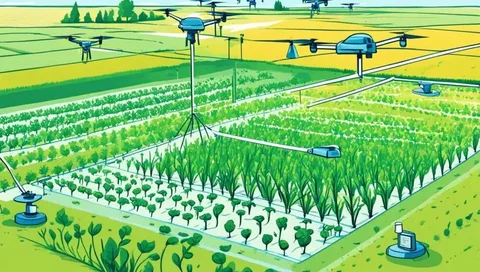In recent years, farming has undergone a significant transformation thanks to technological advancements. Among these, precision agriculture stands out as a game-changer, revolutionizing how farmers manage their crops and resources. Revolutionizing farming: the role of precision agriculture in modern crop management is a critical topic that highlights how technology is reshaping agricultural practices to increase efficiency, sustainability, and productivity.
Understanding Precision Agriculture
Precision agriculture refers to the use of advanced technologies like GPS, drones, sensors, and data analytics to monitor and optimize crop growth. Unlike traditional farming methods, which often apply uniform treatments to entire fields, precision agriculture allows farmers to tailor interventions based on real-time data from specific zones within their fields. This targeted approach helps in reducing waste, minimizing environmental impact, and improving overall crop health.
How Precision Agriculture is Transforming Crop Management
The role of precision agriculture in modern crop management is multifaceted. First, it enables precise monitoring of soil conditions, moisture levels, and nutrient content, allowing for more accurate fertilization and irrigation. Sensors placed throughout fields can detect problems early, such as pest infestations or nutrient deficiencies, enabling farmers to address issues before they escalate.
Secondly, GPS-guided machinery ensures that planting, fertilizing, and harvesting are performed with exact precision, reducing overlaps and gaps. This not only boosts yield but also cuts down on costs and resource usage.
Benefits of Precision Agriculture in Modern Farming
The advantages of revolutionizing farming: the role of precision agriculture in modern crop management extend beyond increased productivity. Environmental benefits include reduced chemical runoff and lower greenhouse gas emissions due to optimized input usage. Economically, farmers save money by avoiding unnecessary expenditure on seeds, water, and fertilizers.
Furthermore, data collected through precision agriculture tools helps in making informed decisions, planning future crop cycles better, and adapting to climate change impacts more effectively.
Challenges and Future Outlook
While precision agriculture offers many benefits, its adoption faces challenges such as high initial investment costs and the need for technical knowledge. However, as technology becomes more affordable and accessible, more farmers worldwide are expected to embrace these innovations.
Looking ahead, the integration of AI and machine learning with precision agriculture could further revolutionize farming, making crop management smarter and more sustainable.
In conclusion, revolutionizing farming: the role of precision agriculture in modern crop management is reshaping the agricultural landscape by enhancing efficiency and sustainability. This innovative approach promises to support global food security while protecting the environment, marking a new era in farming practices.


